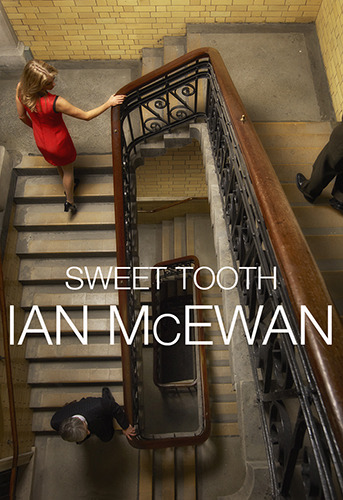Literature as propaganda.
Serena has been recruited by MI5. In her spare time, she devours paperback novels. The project to which she's been assigned, codename Sweet Tooth, is to handpick some writers, academics, and journalists, finance them, and nurture their craft. There are political motivations for sidestepping the usual national arts funding mechanism. Recipients should be talented enough to become popular and thus hold some sway over public opinion, unknowingly helping to shape MI5-preferred sentiments regarding communism, freedom, and other matters of national interest.
"We're not interested in the decline of the West, or down with progress or any other modish pessimism. [...] We're looking for the sort who might spare a moment for his hard-pressed fellows in the Eastern bloc, travels out there perhaps to lend support or sends books, signs petitions for persecuted writers, engages his mendacious Marxist colleagues here, isn't afraid to talk publicly about writers in prison in Castro's Cuba. Generally swims against the orthodox flow."This wasn't the first Western strike in the culture war; the CIA had previously none-too-subtly backed a highbrow culture magazine, so obvious it backfired. And as propaganda, without the broad appeal to the masses, it failed.
All this takes place in 1972 England (the Cold War is still going strong, but a new threat has developed: the IRA). Sweet Tooth's chosen writer turns in a prize-winning novel, but it didn't take the Booker.
A cross-check with reality shows that the 1972 Booker Prize was awarded to John Berger for G. Berger donated half his cash prize to the Black Panther Party in Britain and retained half to support his work on the study of migrant workers, both being necessary parts of his political struggle. I'd never heard of him.
Art has always been political. It got me thinking: Could propaganda of this nature actually be alive and well in the West? Are there intelligence-agency puppet masters pulling the strings of pop culture?
A man writing a feminist novel.
Perhaps Sweet Tooth is not so strikingly feminist, only my sensibilities in the last few weeks have primed me to see it so. I read most of Orhan Pamuk's A Strangeness in My Mind, which he calls a feminist novel, but the first two-thirds of which is not really. I read Monica Ali's In the Kitchen, featuring a very dislikeable man with very little regard for women, and tangentially addressing the issue societal expectations of women (oh, and, human trafficking and prostitution). Last but not least, I saw Gloria Steinem speak, and she drove home the point that of course we should all be feminists.
McEwan has an uncanny way of getting inside a woman's head. (My head at least.)
I was beginning to feel a distinctive and unusual kind of pleasure, a sense of being set free. In a portion of mental space, perhaps quite a large portion, I was actually cleverer than Tom. How strange that seemed. What was so very simple for me, for him was apparently beyond comprehension.No man would ever feel this.
[It's not that the realization of one's cleverness is striking in itself. It's that it's worth noting at all, even by oneself, to oneself. Mid-80s, high-school calculus; I was cleverer than all the boys in the room, and it was mostly boys in the room. And teacher made a point of saying so. If it was a compliment, why did I feel condescended to? Why did he say it if not to shame them and embarrass me?]
The novelist character at one point talks about the need to be a transvestite, figuratively I assume, to fully inhabit his women characters. I wonder what McEwan's method of study is. Did he shag a spy? (I bet he's good in bed.)
I couldn't bear to look at him. I was irritated by the way he conflated his own shifting needs with an impersonal destiny. I want it, therefore... it's in the stars! What was it with men, that they found elementary logic so difficult? I looked along the line of my shoulder towards the hissing gas rings. The kitchen was warming up at last and I loosened my dressing gown at the neck. I pushed my dishevelled hair clear of my face to hep me think clearly. He was waiting for me to make the correct confession, to align my desires with his, to confirm him in his solipsism and join him in it. But perhaps I was being too hard on him. This was a simple misunderstanding. At least, that was how I intended to treat it.In all McEwan's Serena feels like an accurate rendition of the female psyche. And the novel's portrayal of life for a working woman in 1972 feels pretty authentic too. I bought into it; the novel works for me.
On the other hand, Maureen Corrigan hated Sweet Tooth (warning: her review is ambiguously spoiler-y): "Oh, what fun McEwan has squirting acid over everything simple Serena — clearly, the Common (Female) Reader — enjoys in a novel." Your mileage may vary.





